Pay-per-click (PPC) advertising is an essential part of many small businesses’ marketing strategies. It allows businesses to display ads on search engines, social media platforms, and other websites, where they only pay when someone clicks on the ad. While PPC offers an excellent way to drive targeted traffic to your website, it can quickly become expensive if not managed correctly. For small businesses, managing PPC budgets is crucial to ensuring that every dollar spent contributes to positive returns and business growth.
This guide will delve into effective PPC budget management, its importance for small businesses, where to focus your efforts, how to adjust your spending, and practical tips to help you get the most out of your PPC campaigns.
What is PPC Budget Management?
PPC budget management involves strategically allocating and monitoring your advertising spend across different PPC campaigns to optimize performance and maximize your return on investment (ROI). Since every click costs money, the goal is to ensure that each dollar you invest in your ads brings you a valuable conversion or leads to some measurable return.
Budget management in PPC encompasses several activities:
- Setting a budget: Deciding how much money you’re willing to allocate to your PPC campaigns.
- Monitoring ad spend: Keeping track of where your money is going and how efficiently it’s being used.
- Optimizing campaigns: Adjusting your bidding strategies, keywords, and ad placements to improve results.
- Evaluating performance: Measuring the success of campaigns based on key performance indicators (KPIs), such as cost per click (CPC), conversion rates, and overall ROI.
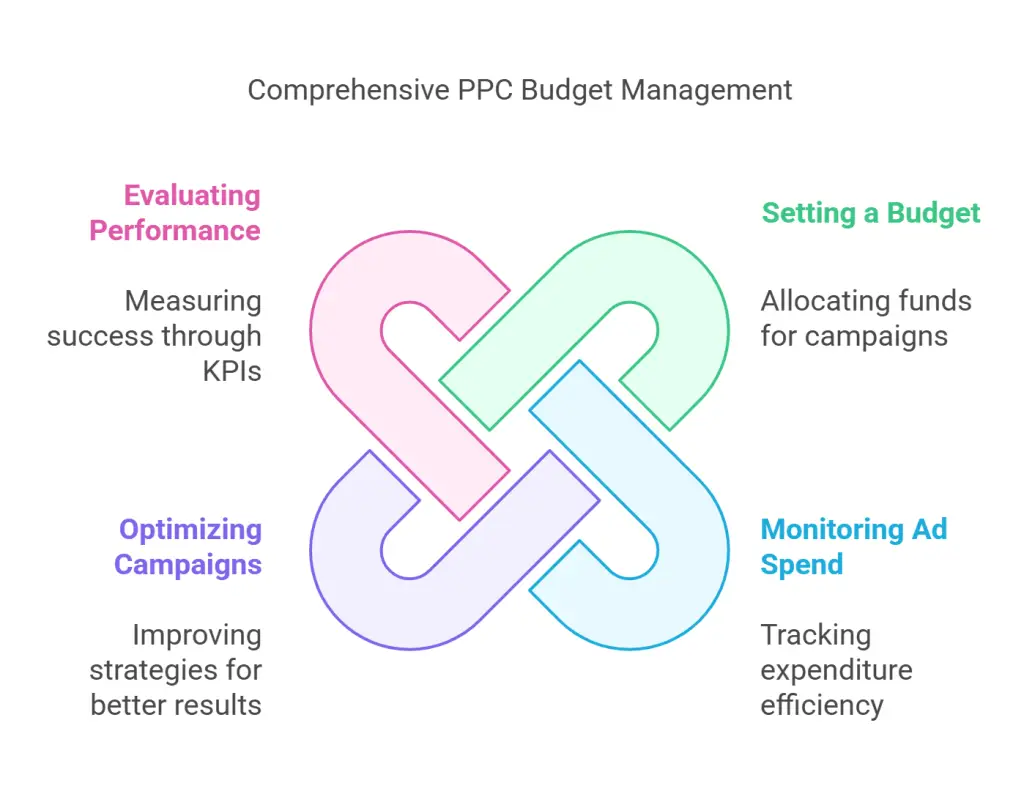
In essence, PPC budget management is about making sure you’re spending your advertising dollars as efficiently as possible. This requires ongoing analysis, testing, and adjustments to keep up with changing market conditions, competitor actions, and campaign performance metrics.
Why is Budget Management Important for Small Businesses?
For small businesses, every dollar matters. Unlike large corporations with vast marketing budgets, small businesses must be more careful about how they allocate resources. Budget mismanagement can lead to wasted ad spend, poor performance, and ultimately, lower ROI. Let’s explore some of the main reasons why managing your PPC budget is essential for small businesses:
1. Maximizing ROI
Effective budget management ensures that you’re not overspending on ineffective campaigns. It helps you invest more in ads that are delivering results and reduce or eliminate spend on underperforming ads. By continuously optimizing where and how your budget is allocated, you can maximize your return on investment.
2. Controlling Costs
PPC platforms like Google Ads or Facebook Ads operate on an auction-based model where costs can fluctuate depending on the competitiveness of your keywords, audience, and industry. Without close monitoring, you can quickly overspend on high-cost keywords that may not provide sufficient returns. Budget management helps control these costs by limiting bids or ad spending to stay within predefined limits.
3. Allocating Resources Efficiently
Small businesses often juggle multiple marketing initiatives with limited resources. Proper budget management allows you to allocate resources efficiently by focusing on high-impact campaigns. This means prioritizing the most profitable products or services and avoiding the temptation to spread your budget too thin across multiple, less-effective campaigns.
4. Improving Performance Over Time
Ongoing budget analysis and adjustments lead to continuous improvement in campaign performance. Small businesses can take advantage of incremental changes to boost ad effectiveness, drive better traffic, and ultimately improve conversion rates.
5. Avoiding Ad Spend Waste
Mismanaged PPC budgets can lead to significant waste. Spending too much on non-converting keywords, targeting the wrong audience, or not adjusting your campaigns to match seasonal trends can drain your advertising dollars. Effective budget management prevents this by ensuring your funds are directed toward what works.
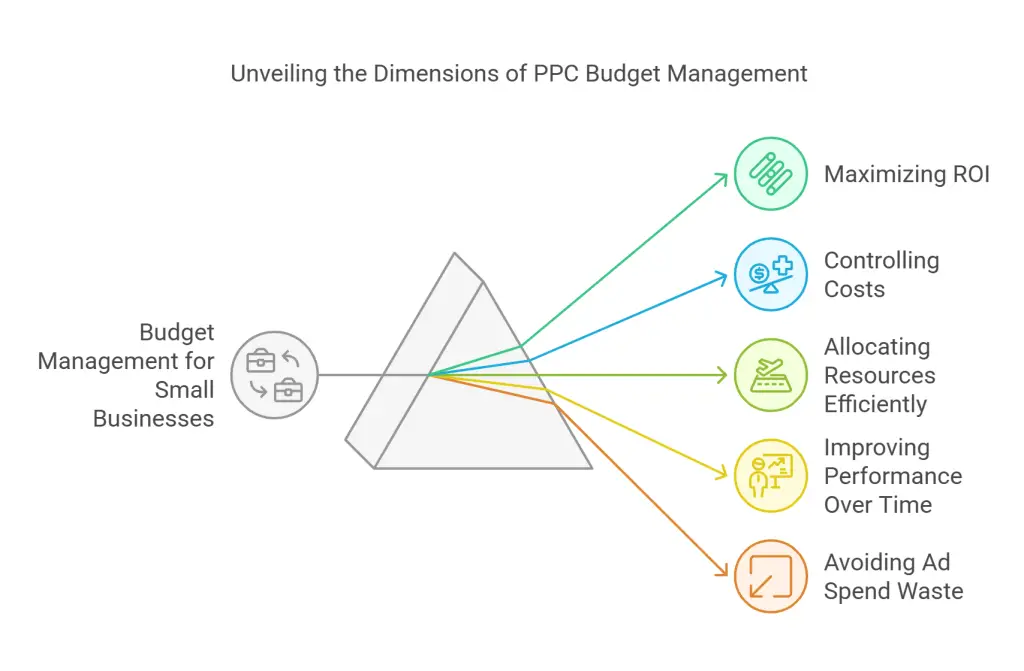
Where to Focus Your Budget Management Efforts
Managing a PPC budget involves several key areas of focus. To ensure you are optimizing every aspect of your PPC campaigns, it’s important to understand where to direct your attention. Below are some of the most critical areas to focus on:
1. Bid Strategies
Choosing the right bid strategy is essential for controlling your costs and maximizing your ROI. PPC platforms offer a variety of bidding strategies, from manual bidding (where you set your bids) to automated bidding (where the platform optimizes bids for you). Each approach has its pros and cons depending on your goals. For example:
- Manual bidding gives you full control but requires more effort to monitor and adjust.
- Automated bidding can save time by automatically optimizing bids for conversions, but you may not have as much control over individual bids.
By testing different bidding strategies, you can find what works best for your business.
2. Ad Spend Analysis
Regularly analyzing where your ad spend is going is crucial for budget management. You should track metrics like:
- Cost per click (CPC): How much you’re paying per click.
- Cost per acquisition (CPA): The average cost to acquire a new customer.
- Click-through rate (CTR): The percentage of people who clicked your ad after seeing it.
- Conversion rate: The percentage of clicks that resulted in a desired action (purchase, signup, etc.).
By analyzing these metrics, you can identify which campaigns, keywords, or ad placements are costing too much and adjust accordingly.
3. Performance Tracking
Track the performance of your campaigns regularly to ensure your PPC budget is being used effectively. Tools like Google Analytics, Google Ads, or Facebook Ads Manager provide insights into how well your ads are performing. Focus on the following KPIs:
- Quality Score: A measure used by Google Ads to determine the relevance and quality of your ads.
- Return on Ad Spend (ROAS): The amount of revenue generated for each dollar spent on advertising.
- Impressions: The number of times your ad is displayed.
Monitoring these KPIs will help you pinpoint which campaigns are driving results and which are underperforming.
4. Keyword Management
Your choice of keywords plays a huge role in your PPC success. Regularly conduct keyword research to identify high-converting keywords and pause or remove non-converting or high-cost keywords. Tools like Google’s Keyword Planner or SEMrush can help you uncover new opportunities while identifying negative keywords that are draining your budget without delivering results.
5. Geographic Targeting
If you are a small business with a local customer base, you may want to focus your budget on geographic targeting. Geo-targeting ensures that your ads are only shown to people in specific locations, helping you avoid wasting money on clicks from users outside your service area.
6. Ad Copy and Creative
The performance of your ads is influenced not only by keywords and targeting but also by the quality of your ad copy and creative. Continuously test different headlines, descriptions, images, and call-to-actions (CTAs) to improve your ads’ effectiveness. A small change in your ad copy can sometimes make a big difference in click-through rates and conversions.
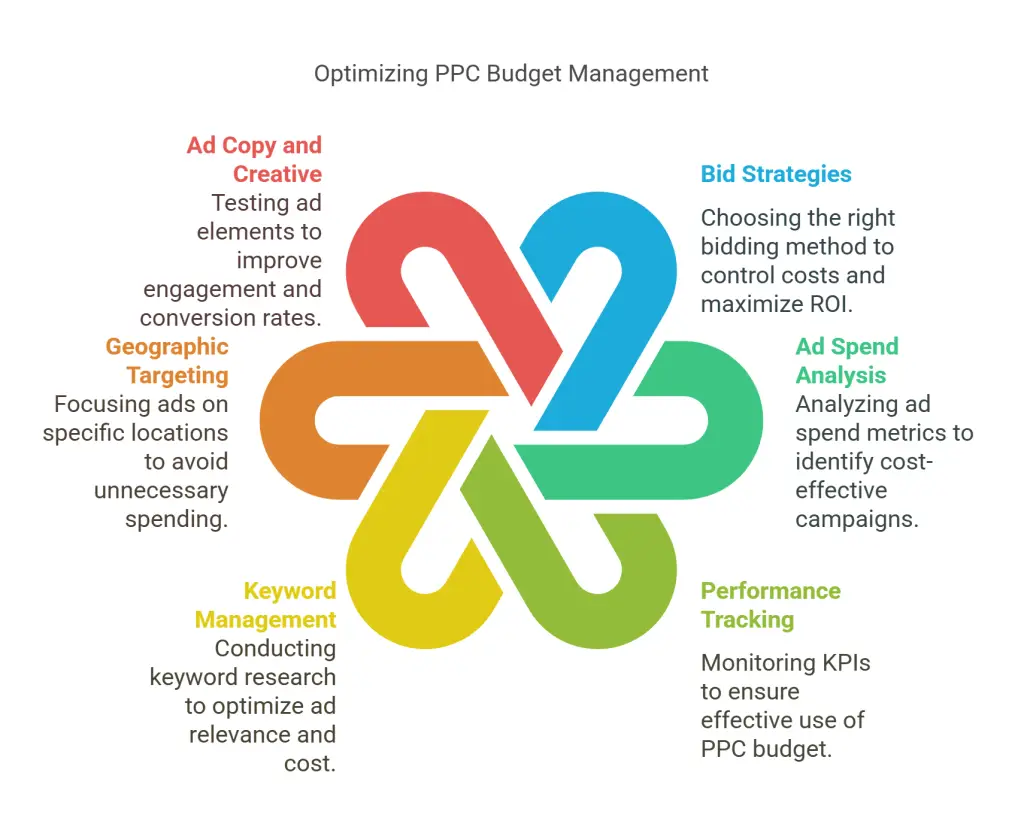
When to Adjust and Reallocate PPC Budgets
Effective PPC budget management involves making timely adjustments to ensure you’re always optimizing for the best performance. But when should you adjust your budget? Here are some key moments when you should consider reallocating your ad spend:
1. When Campaigns are Underperforming
If a particular campaign, keyword, or ad group isn’t delivering the desired results, it’s time to reevaluate your spending. Underperforming campaigns drain your budget and negatively impact your overall ROI. Look at your conversion rate, CTR, and CPA to assess performance, and make adjustments such as lowering bids, changing ad creative, or reallocating the budget to higher-performing campaigns.
2. When You Identify High-Performing Campaigns
On the other hand, when a campaign is performing exceptionally well, consider reallocating more of your budget to it. High-performing campaigns often yield better ROAS, and directing more resources towards these can boost your revenue without increasing your overall ad spend. Ensure that you monitor performance metrics closely to capitalize on these opportunities.
3. During Seasonal Peaks
Many businesses experience seasonal fluctuations in demand. For example, retail businesses may see a surge in sales during the holiday season. Adjusting your PPC budget to account for these peaks ensures that you capitalize on increased demand. On the flip side, reducing your ad spend during slower periods can help preserve your budget for times when it will have a bigger impact.
4. When Competitor Activity Changes
PPC advertising is competitive, and changes in your competitors’ strategies can impact your campaign performance. If a competitor increases their bids or launches a new campaign, you may need to adjust your bids or ad targeting to stay competitive.
5. When New Products or Services are Introduced
If your business launches a new product or service, you may want to allocate some of your PPC budget to promote it. However, it’s essential to monitor the new campaigns closely to ensure they perform well before committing significant resources.
6. After Reviewing Data and Analytics
Regularly reviewing your PPC data and analytics helps you stay on top of trends and make data-driven decisions. A weekly or monthly budget review can uncover insights that help you reallocate funds for optimal performance. For example, if you find that mobile users are converting at a higher rate than desktop users, you might shift more of your budget to mobile campaigns.
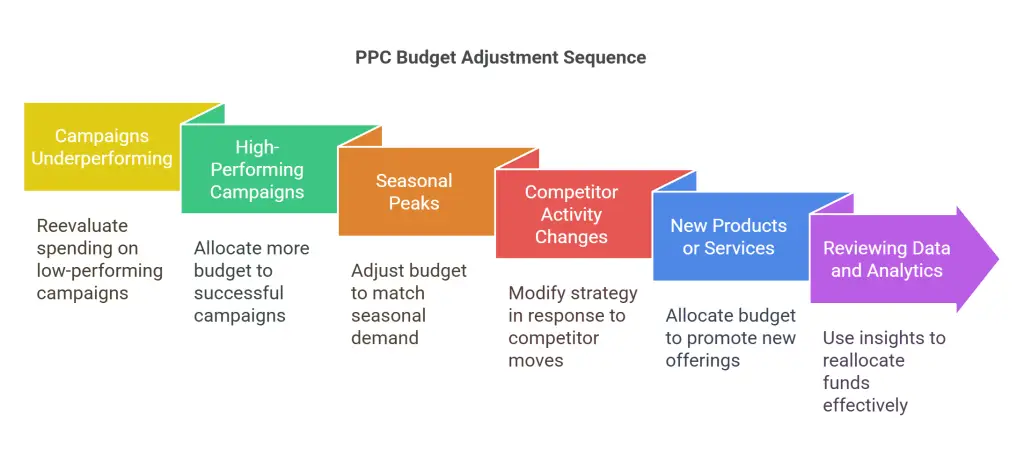
Tips for Managing PPC Budgets Effectively
Now that you understand where to focus your efforts and when to make adjustments, here are some practical tips to help you manage your PPC budget effectively:
1. Set Clear Goals
Before launching any PPC campaign, it’s essential to set clear goals. What do you want to achieve? Are you looking to drive traffic to your website, generate leads, or increase sales? Having clear goals helps you determine how much budget you need and how to allocate it. For instance, a lead generation campaign might require a different budget allocation than a campaign aimed at driving product sales.
2. Start Small and Scale Gradually
For small businesses with limited budgets, it’s often best to start with smaller campaigns to test the waters. Focus on a few high-priority products or services, set a modest budget, and see how the campaign performs. Once you’ve gathered enough data, you can gradually scale up by increasing the budget for high-performing campaigns.
3. Use Bid Adjustments
Many PPC platforms, including Google Ads, allow you to adjust bids based on factors such as device type, time of day, and geographic location. For example, you can increase bids for mobile users if they tend to convert more frequently or decrease bids during off-peak hours. Using bid adjustments helps you spend your budget more efficiently by focusing on segments that are more likely to convert.
4. Leverage Remarketing
Remarketing (or retargeting) allows you to show ads to users who have previously visited your website but didn’t convert. These users are more likely to convert in the future, making remarketing campaigns a cost-effective way to boost conversions. By allocating a portion of your budget to remarketing, you can increase your chances of capturing those lost leads.
5. Monitor Campaigns Regularly
PPC campaigns are not a “set it and forget it” strategy. To ensure your budget is being used effectively, you need to monitor campaigns regularly. Look at performance metrics such as CTR, conversion rates, and CPA, and make adjustments as needed. Regular monitoring allows you to identify problems early and prevent budget waste.
6. Test and Optimize Continuously
The most successful PPC campaigns are the result of continuous testing and optimization. Test different ad formats, headlines, and CTAs to see what resonates best with your audience. A/B testing is a great way to compare different elements of your campaign and find what works best. Use the insights from these tests to optimize future campaigns and improve overall performance.
7. Utilize Negative Keywords
Negative keywords are words or phrases that prevent your ads from being shown to irrelevant audiences. For example, if you sell high-end luxury furniture, you may want to add “cheap” or “affordable” as negative keywords to avoid wasting money on clicks from users looking for lower-cost options. Using negative keywords ensures that your ads are only shown to relevant audiences, helping you spend your budget more effectively.
8. Set Daily and Monthly Budgets
To prevent overspending, set clear daily and monthly budget limits for each campaign. Most PPC platforms allow you to specify a maximum daily spend, ensuring you stay within your overall budget. By setting budget caps, you can protect yourself from sudden spikes in ad spend that may occur if a campaign performs unexpectedly well.
9. Prioritize High-Converting Keywords
Over time, you’ll identify which keywords are driving the most conversions. Prioritize these high-converting keywords in your campaigns by increasing bids or allocating more of your budget to them. On the flip side, reduce spending on low-converting or high-cost keywords that aren’t delivering results.
10. Keep Learning and Adapting
The PPC landscape is constantly evolving, with new features, tools, and strategies being introduced regularly. Stay up to date with the latest PPC trends and best practices by reading industry blogs, attending webinars, or participating in online forums. Continuous learning allows you to adapt your strategies to new developments and stay ahead of your competitors.
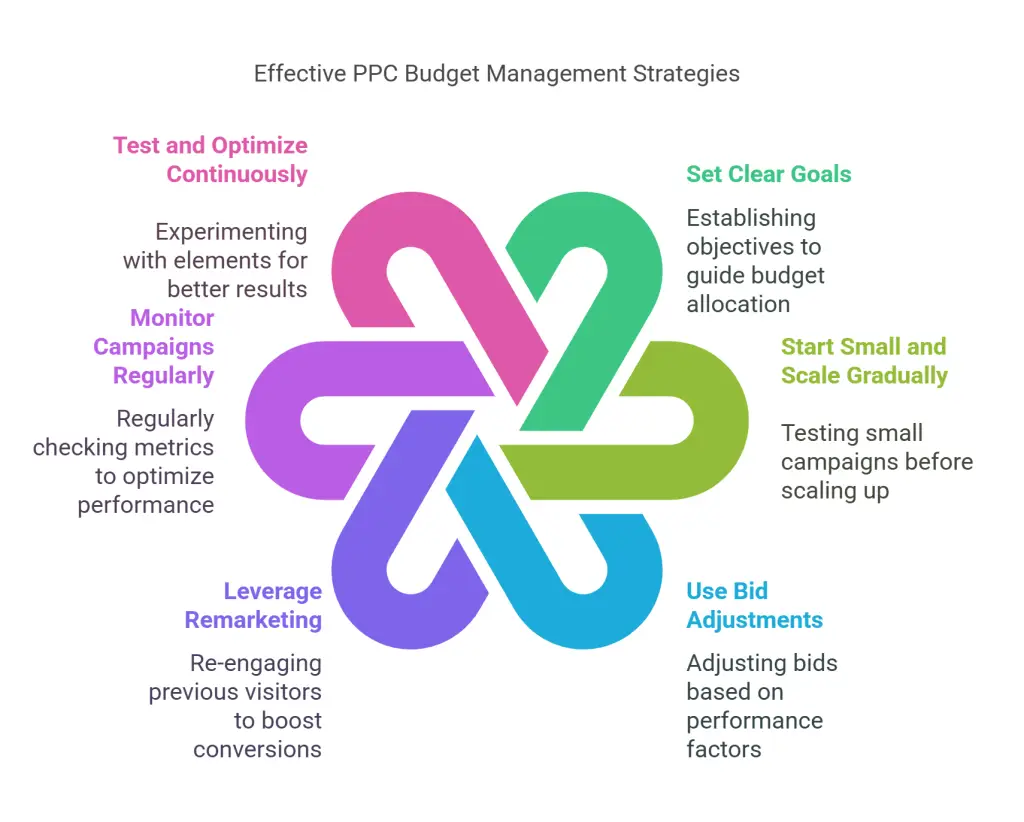
Conclusion
PPC budget management is a critical aspect of running successful advertising campaigns, especially for small businesses with limited resources. By focusing on key areas like bid strategies, ad spend analysis, and performance tracking, and knowing when to adjust your budgets, you can maximize your ROI and avoid wasting money on underperforming ads.
With the right approach, managing a PPC budget doesn’t have to be complicated. Start by setting clear goals, monitor your campaigns regularly, and make data-driven adjustments based on performance metrics. With continuous testing and optimization, you can ensure that your PPC budget is being used as effectively as possible, driving valuable traffic, leads, and sales for your business.
Frequently Asked Questions
hat is PPC budget management?
PPC budget management involves strategically allocating and monitoring your advertising spend across different PPC campaigns to optimize performance and maximize your return on investment (ROI).
Why is PPC budget management important for small businesses?
Effective budget management ensures that every dollar spent contributes to positive returns and business growth, which is crucial for small businesses with limited resources.
How can small businesses control PPC costs?
By closely monitoring ad spend, limiting bids, and focusing on high-impact campaigns, small businesses can control costs and prevent overspending on ineffective ads.
What are key activities in PPC budget management?
Key activities include setting a budget, monitoring ad spend, optimizing campaigns, and evaluating performance based on key performance indicators (KPIs).
How does PPC budget management improve campaign performance?
Ongoing budget analysis and adjustments lead to continuous improvement in campaign performance, driving better traffic and improving conversion rates over time.
Further Reading
Improvado. “PPC Budget Allocation: Strategies to Maximize ROI.” Improvado Blog, February 26, 2024. https://improvado.io/blog/ppc-budget-allocation. Accessed March 7, 2025.
Surfside PPC. “How to Set a Google Ads Budget – Daily, Monthly, and Annual Budgets.” YouTube, April 12, 2022. https://www.youtube.com/watch?v=0xwFPYJB7s8. Accessed March 7, 2025.
KlientBoost. “How to Manage Your PPC Budget Across Multiple Campaigns.” YouTube, October 27, 2021. https://www.youtube.com/watch?v=WwK2pidHnFk. Accessed March 7, 2025.
Lead Genera. “The Complete Guide to PPC Management.” Lead Genera Knowledge Hub, September 5, 2023. https://leadgenera.com/knowledge-hub/ppc/the-complete-guide-to-ppc-management/. Accessed March 7, 2025.
Vendasta. “PPC Budgeting: How to Allocate, Spend, and Optimize Your Ad Budget.” Vendasta Blog, June 14, 2023. https://www.vendasta.com/blog/ppc-budgeting/. Accessed March 7, 2025.
Adalysis. “PPC Budget Management Tools and Strategies for Success.” Adalysis Blog, January 3, 2024. https://adalysis.com/ppc-budget-management-tools/. Accessed March 7, 2025.
NinjaPromo. “How to Calculate a PPC Budget: A Guide for Digital Marketers.” NinjaPromo Blog, November 8, 2023. https://ninjapromo.io/how-to-calculate-ppc-budget. Accessed March 7, 2025.
GoClick Media. “Effective Budget Management in PPC: Tips and Best Practices.” GoClick Media Blog, August 22, 2023. https://goclick.media/effective-budget-management-in-ppc/. Accessed March 7, 2025.







